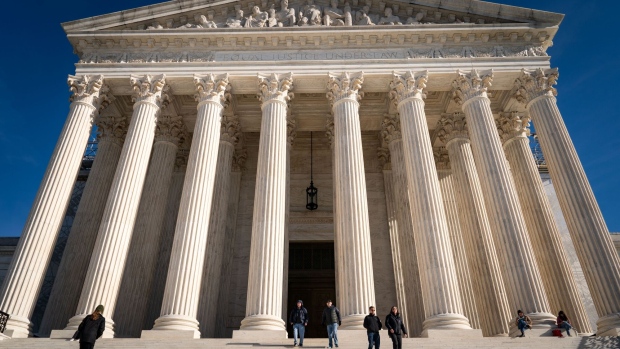Feb 26, 2024
Supreme Court Fears ‘Landmines’ in Social Media Debate Over Free Speech
, Bloomberg News

(Bloomberg) -- The US Supreme Court struggled to find a middle ground on the application of free-speech principles to the internet, as the justices reviewed Republican-backed laws that would sharply restrict the editorial discretion of the largest social media companies.
Hearing arguments for almost four hours Monday in Washington, members from across the court’s ideological spectrum suggested reluctance to completely strike down new laws in Texas and Florida, as trade groups representing Meta Platforms Inc.’s Facebook and Alphabet Inc.’s Google are seeking.
But a majority of justices also expressed concern about how the laws’ core provisions would apply to decisions to take down hate speech and misinformation and block users who don’t comply with the platforms’ terms of service.
Those competing instincts left the court as a whole unsure how to handle cases that Justice Amy Coney Barrett said had “a bunch of land mines” that might have unforeseen implications down the road. The court, which is likely to issue an opinion by June, could stop short of deciding the fate of the laws by sending them back to lower courts. Both laws are currently on hold.
Social Media’s Content Rules Are Up to Supreme Court: QuickTake
Companies say the laws would impose onerous requirements and put sites at risk of being overrun by spam and bullying. Supporters of the laws — including Florida Governor Ron DeSantis and Texas Governor Greg Abbott — say they are needed to prevent discrimination against conservative voices.
The laws were enacted in part as a response to decisions by some platforms to oust former President Donald Trump after the Jan. 6, 2021, Capitol attack.
The measures drew support from Justice Clarence Thomas, who repeatedly said social media companies were engaged in censorship. “I don’t know of any protected speech interest in censoring other speech,” he said.
‘Public Square’
But Chief Justice John Roberts suggested that was the wrong way to think about the First Amendment, which applies to the government, but not to private parties.
“I wonder since we’re talking about the First Amendment, whether our first concern should be with the state regulating what we have called the modern public square,” Roberts said.
The Atlanta-based 11th US Circuit Court of Appeals temporarily blocked most of Florida’s law as probably violating the First Amendment. The New Orleans-based 5th Circuit upheld the Texas law, though the measure is likewise on hold for now.
Much of the session focused on potentially pivotal procedural questions. Several justices pointed to the trade groups’ decision to press “facial” challenges — an approach that normally requires a litigant to show that all aspects of the law are unconstitutional.
Those justices asked whether the laws’ anti-discrimination provisions could be constitutionally applied to Google’s Gmail or Uber Technologies Inc.’s ride-sharing service.
“If we come up with some scenarios in this context, in which we can envision it not being unconstitutional, why don’t you lose?” Justice Ketanji Brown Jackson asked Paul Clement, the lawyer representing the trade groups.
Justice Samuel Alito asked whether the tech industry would argue Gmail has a First Amendment right to boot account holders such as GOP commentator Tucker Carlson or liberal journalist Rachel Maddow based on their politics. “They might be able to do that, your honor,” Clement replied.
The centerpiece of the Texas law is a sweeping provision that bars large platforms from discriminating based on viewpoint. The prohibition includes a handful of exceptions, including letting platforms bar content that incites violence or criminal activity or involves the sexual exploitation of children or the harassment of sexual-abuse survivors.
The Florida law includes a dozen major provisions, including a requirement that platforms provide a “thorough rationale” for each content-moderation decision.
The Florida case is Moody v. NetChoice, 22-277. The Texas case is NetChoice v. Paxton, 22-555.
©2024 Bloomberg L.P.





